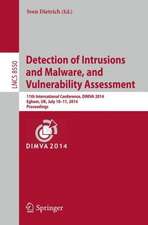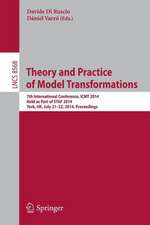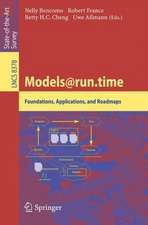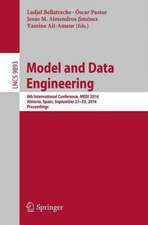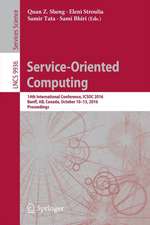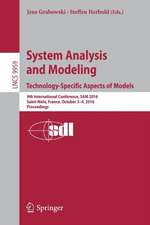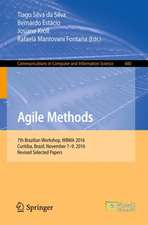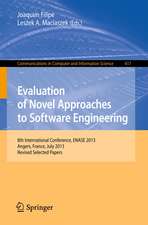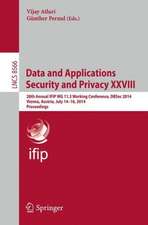Software Quality and Productivity: Theory, practice, education and training: IFIP Advances in Information and Communication Technology
Editat de M. Lee, Ben-Zion Barta, Peter Juliffen Limba Engleză Hardback – 31 dec 1994
| Toate formatele și edițiile | Preț | Express |
|---|---|---|
| Paperback (1) | 1277.70 lei 6-8 săpt. | |
| Springer Us – 3 mar 2013 | 1277.70 lei 6-8 săpt. | |
| Hardback (1) | 1284.14 lei 6-8 săpt. | |
| Springer Us – 31 dec 1994 | 1284.14 lei 6-8 săpt. |
Din seria IFIP Advances in Information and Communication Technology
- 20%
 Preț: 170.51 lei
Preț: 170.51 lei - 20%
 Preț: 615.75 lei
Preț: 615.75 lei - 20%
 Preț: 340.32 lei
Preț: 340.32 lei -
 Preț: 397.38 lei
Preț: 397.38 lei - 20%
 Preț: 336.02 lei
Preț: 336.02 lei - 20%
 Preț: 340.98 lei
Preț: 340.98 lei - 20%
 Preț: 503.43 lei
Preț: 503.43 lei - 17%
 Preț: 523.41 lei
Preț: 523.41 lei - 20%
 Preț: 502.07 lei
Preț: 502.07 lei - 17%
 Preț: 488.99 lei
Preț: 488.99 lei - 20%
 Preț: 501.05 lei
Preț: 501.05 lei - 20%
 Preț: 403.20 lei
Preț: 403.20 lei - 20%
 Preț: 2194.47 lei
Preț: 2194.47 lei - 15%
 Preț: 708.83 lei
Preț: 708.83 lei - 20%
 Preț: 1162.14 lei
Preț: 1162.14 lei - 20%
 Preț: 1288.25 lei
Preț: 1288.25 lei - 18%
 Preț: 1227.21 lei
Preț: 1227.21 lei - 20%
 Preț: 1282.00 lei
Preț: 1282.00 lei - 18%
 Preț: 1224.18 lei
Preț: 1224.18 lei - 18%
 Preț: 953.03 lei
Preț: 953.03 lei - 18%
 Preț: 953.20 lei
Preț: 953.20 lei - 18%
 Preț: 944.99 lei
Preț: 944.99 lei - 18%
 Preț: 948.29 lei
Preț: 948.29 lei - 15%
 Preț: 645.47 lei
Preț: 645.47 lei - 18%
 Preț: 960.13 lei
Preț: 960.13 lei - 20%
 Preț: 1288.11 lei
Preț: 1288.11 lei - 15%
 Preț: 645.79 lei
Preț: 645.79 lei - 20%
 Preț: 1271.10 lei
Preț: 1271.10 lei - 20%
 Preț: 1922.99 lei
Preț: 1922.99 lei - 20%
 Preț: 1285.97 lei
Preț: 1285.97 lei - 18%
 Preț: 956.69 lei
Preț: 956.69 lei - 18%
 Preț: 946.72 lei
Preț: 946.72 lei - 18%
 Preț: 1224.36 lei
Preț: 1224.36 lei - 20%
 Preț: 1277.89 lei
Preț: 1277.89 lei - 18%
 Preț: 953.03 lei
Preț: 953.03 lei - 18%
 Preț: 947.98 lei
Preț: 947.98 lei - 20%
 Preț: 1292.54 lei
Preț: 1292.54 lei - 18%
 Preț: 956.18 lei
Preț: 956.18 lei - 20%
 Preț: 645.79 lei
Preț: 645.79 lei - 20%
 Preț: 1284.47 lei
Preț: 1284.47 lei - 18%
 Preț: 1235.25 lei
Preț: 1235.25 lei - 20%
 Preț: 998.70 lei
Preț: 998.70 lei - 18%
 Preț: 949.23 lei
Preț: 949.23 lei - 20%
 Preț: 1283.81 lei
Preț: 1283.81 lei - 20%
 Preț: 995.89 lei
Preț: 995.89 lei - 18%
 Preț: 1231.01 lei
Preț: 1231.01 lei - 20%
 Preț: 993.09 lei
Preț: 993.09 lei - 20%
 Preț: 1288.94 lei
Preț: 1288.94 lei - 20%
 Preț: 987.17 lei
Preț: 987.17 lei
Preț: 1284.14 lei
Preț vechi: 1605.18 lei
-20% Nou
Puncte Express: 1926
Preț estimativ în valută:
245.75€ • 255.62$ • 202.88£
245.75€ • 255.62$ • 202.88£
Carte tipărită la comandă
Livrare economică 14-28 aprilie
Preluare comenzi: 021 569.72.76
Specificații
ISBN-13: 9780412629600
ISBN-10: 0412629607
Pagini: 404
Ilustrații: XII, 404 p.
Dimensiuni: 155 x 235 x 24 mm
Greutate: 0.76 kg
Ediția:1995
Editura: Springer Us
Colecția Springer
Seria IFIP Advances in Information and Communication Technology
Locul publicării:New York, NY, United States
ISBN-10: 0412629607
Pagini: 404
Ilustrații: XII, 404 p.
Dimensiuni: 155 x 235 x 24 mm
Greutate: 0.76 kg
Ediția:1995
Editura: Springer Us
Colecția Springer
Seria IFIP Advances in Information and Communication Technology
Locul publicării:New York, NY, United States
Public țintă
ResearchCuprins
One Keynote papers.- 1 Towards the 21st Century’s software quality, state-of-the-art and international standard in JTC1/SC7.- 2 Software quality and productivity improvement.- Two Requirements, Design and Development Methodologies.- 3 Progress towards RACE: a ‘soft-centred’ requirements definition method.- 4 MOOSE: A method designed for ease of maintenance.- 5 BPR for developing information systems — a case study.- 6 Towards a methodology for 24 hour software production using globally separated development teams.- 7 MetaMet — a soft systemic way toward the quality of information systems.- 8 Changing programming paradigm — an empirical investigation.- 9 Application-oriented methods for systems development — a review.- 10 A proposal for composing software design process.- 11 Team-based software development using an electronic meeting system: the quality pay-off.- 12 Designing with non-functional requirements.- 13 Modelling the requirements of process controlled systems.- 14 Compiling heterarchical programs by means of Petri nets.- Three Object Oriented Analysis, Design and Development.- 15 Type checking classes in Object-Z to promote quality of specifications.- 16 An axiom-based test case selection strategy for object-oriented programs.- 17 AMI: a case tool based on artificial intelligence techniques for an interactive modelling for analysis.- 18 Object-oriented framework for requirement specification.- 19 A structured object-oriented view on systems modeling.- 20 Construction of a WYSIWYG LaTeX typesetting system using object-oriented design.- 21 A re-engineering approach for object-oriented database design.- Four Software Process and Capability.- 22 Software process model specification.- 23 Soft systems methodology — a process view.- 24 BOOTSTRAP —improving the capability of software industry with database support.- Five Project Management.- 25 On the optimal timing of software development cycle.- 26 Information systems project manager’s critical success factors: in-house verses outsourced development.- 27 Measuring the value and performance of your IT department.- Six Quality, Reliability, Standards.- 28 ISO standards in software engineering.- 29 An investigation of desired quality attributes for different types of software.- 30 A unifying model for software quality engineering.- 31 Quality achievement: current practices and the way ahead.- 32 Software reliability models for practical applications.- 33 Assessing the quality of requirements engineering products.- 34 Re-certification of software reliability without re-testing.- 35 SAFE: a programming language for software quality.- 36 Impact of organisational maturity on software quality.- 37 Using strongest postconditions to improve software quality.- Seven Specifications, Metrics, Assessment.- 38 Experience in software inspection techniques.- 39 Measuring process improvement: integrating software process assessment with quality cost evaluation.- 40 Mutation versus all-uses: an empirical evaluation of cost, strength and effectiveness.- 41 Software quality: the user’s point of view.- 42 Complexity measures for system development models.- 43 Composite complexity measures (CCM).- 44 Automated testing tool for NATURAL®.- 45 Analysis of data collected from software development case studies.- 46 A framework for software development technical reviews.- 47 A model-based approach for software test process improvement.- 48 Size estimation for C programs with different applications.- 49 Cyclomatic complexity as a measure of the structure of knowledge-based/expertsystems.- 50 S/C: a software size/complexity measure.- 51 A critical re-examination of cyclomatic complexity measures.- 52 Reliability through cooperative work in software testing.- Eight Reusability.- 53 Code reusability mechanisms.- 54 Rule-based reasoning approach for reusable design component retrieval.- 55 A multi-layer metrics combination model for reusable software components.- Nine Integrated Environments, Case Tools.- 56 Environment for three dimensional graphics user interface development.- 57 PEACE: process evolution and adaptation CASE environment — its framework and requirements.- 58 Software development environments to support model consistency.- Ten Education and Training.- 59 Process oriented instruction for software engineers (POISE): perspectives and experiences.- 60 OO methods in teaching: current experience and future possibilities.- Index of contributors.- Keyword index.
Notă biografică
Ben-Zion Barta is with Bar-Code Computers Ltd., IsraelPeter Juliff is Head of the School of Management and Information Systems, Deakin University, Burwood, Australia












